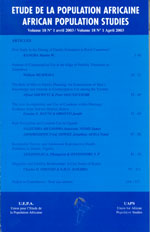
|
African Population Studies
Union for African Population Studies
ISSN: 0850-5780
Vol. 28, No. 2s, 2014, pp. 978-988
|
 Bioline Code: ep14043
Bioline Code: ep14043
Full paper language: English
Document type: Research Article
Document available free of charge
|
|
|
African Population Studies, Vol. 28, No. 2s, 2014, pp. 978-988
| en |
Determinants of contraceptive use among married women in Tanzania: Policy implication
Anasel, Mackfallen G. & Mlinga, Upendo J.
Abstract
Family planning as an ability for couples to control the timing and number of their pregnancies play a crucial role in reducing fertility rate when it efficient and effectively implemented. Despite 96.5% having knowledge on family planning, only 20% are using modern methods. The main objective of study was to find out the determinants of contraceptive use among married women and policy implication in Tanzania. The study use Tanzania Demographic and Health Survey 2004-2005. Data were analysed quantitatively through, binary and multinomial logistic regression. Results show that husband disapproval of contraceptive use, women education, husband and women approval of family planning, discussion of family planning with partners, wealth index, and religion, are determinants of contraceptive use. Based on these results, we recommend increasing women enrolment in all levels of education. This paper suggests that having nice policy, on women empowerment is important but its effective implementation is the most important.
Keywords
Family planning; Determinants; Policy implication; binary and multinomial logistic regression
|
| |
| fr |
Anasel, Mackfallen G. & Mlinga, Upendo J.
Résumé
Le planning familial comme un moyen pour les couples de calculé et contrôle le nombre de leurs grossesses,
jouer un rôle très important en réduite le taux de fécondité si il est exécuter efficacement. Malgré le fait que,
96.5% ont une bonne connaissance du planning familial, 20% seul mettre en place les méthodes modernes
de planification familiale. L’objectif principal de c’est étude, était trouver les déterminants d’usage
contraceptif pour les femmes marié et l’implication politique en Tanzanie. La démographique de Tanzanie et
l’étude sanitaire de 2004-2005 étaient utilisées. Les données étaient quantitativement analysé par
régression logistique multinomiale et binaire. Les résultants montrent que, les déterminants d’usage
contraceptif sont, la réprobation de mari sur l’usage de contraceptif, la connaissance des femmes,
l’approbation de mari et femme sur le planning familial, la discussion des époux sur le planning familial,
l’indice de fortune et religion. Aux termes de conformément à ces résultants, on recommande
l’augmentation d’immatriculation des femmes en tout niveau de formation. C’est étude proposé que, c’est
très important d’avoir la bonne politique d’accorder davantage d’autonomie à les femmes, mais il faut et
très important d’exécute le programme efficacement.
Mots Clés
Le planning familial; Les Déterminants; L’implication politique; Régression logistique multinomiale et Binaire
|
| |
© Copyright 2014 - African Population Studies
Alternative site location: http://www.uaps-uepa.org
|
|
